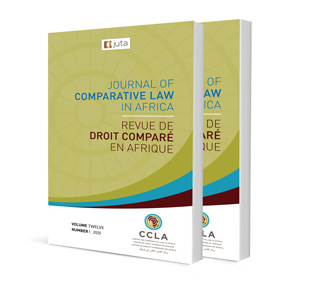
A regulatory analysis of corporate governance and whistleblower protection in the Zimbabwean banking sector
Authors: Oscar Tsaura, Howard Chitimira, Elfas Torerai
ISSN: 2521-2605
Affiliations: BCom in Law, LLB (Unisa), LLM (NWU), LLD (NWU). Postdoctoral Research Fellow,
Faculty of Law, North-West University, South Africa; LLB (Cum Laude), LLM (UFH), LLD (NMMU). Research Director, Research Professor and Professor of Securities and Financial Markets Law, Faculty of Law, North-West University, South Africa; BSc (MSU), LLB (Unisa), LLM (NWU), LLD (NWU). Postdoctoral Research Fellow, Faculty of Law, North-West University, South Africa
Source: Journal of Comparative Law in Africa, Volume 12 Special Edition, p. 160–183
https://doi.org/10.47348/JCLA/v12/2025-SEa6
Abstract
Corporate governance and whistleblower protection are pivotal in the fight against corruption, serving as essential tools to ensure transparency, accountability, and integrity within financial organisations. Corporate governance refers to the system of rules, practices, and processes by which a company is directed and controlled. A sound corporate governance framework ensures that banks operate transparently, responsibly, and in the best interest of their stakeholders. Effective corporate governance involves establishing clear lines of accountability, implementing stringent oversight mechanisms, and fostering a culture of ethical behaviour that promotes transparency and accountability, deters potential corrupt activities, and ensures that decisions are made with integrity and accountability. Whistleblower protection is an integral component of corporate governance. Individuals who report illegal or unethical activities within financial institutions can play a crucial role in exposing corruption within banking institutions. However, the fear of reprisals often deters potential whistleblowers from exposing corporate rot. In this regard, it is crucial to have comprehensive whistleblower protection policies that encourage individuals to report wrongdoing without fear of reprisals. The protections may include legal safeguards, confidentiality provisions, and anti-retaliation measures to ensure whistleblowers can safely disclose information. The presence of effective whistleblower protection encourages a proactive approach to corruption detection, enabling early intervention and mitigating potential damage. This article discusses the relationship between corporate governance and whistleblower protection in Zimbabwe’s banking sector, highlighting how their integration can significantly enhance anti-corruption efforts. It analyses the legislative framework and regulatory policies that support whistleblower protection in Zimbabwe to foster a culture where ethical behaviour is valued and malfeasance shunned.